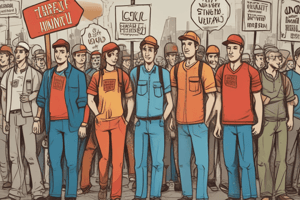Podcast
Questions and Answers
What is the purpose of the National Labor Relations Act in the United States?
What is the purpose of the National Labor Relations Act in the United States?
The National Labor Relations Act in the United States guarantees workers the right to organize and form unions.
What is the role of collective bargaining in labor rights?
What is the role of collective bargaining in labor rights?
Collective bargaining allows trade unions to negotiate with employers on behalf of their members, seeking better wages, working conditions, and other benefits.
Why is the right to strike considered a critical labor right?
Why is the right to strike considered a critical labor right?
The right to strike allows workers to protest against unfair or unsatisfactory working conditions and exert pressure on employers to address issues related to wages, working hours, safety, and job security.
How do labor laws protect workers from discrimination?
How do labor laws protect workers from discrimination?
Why are labor rights considered an integral part of labor practices?
Why are labor rights considered an integral part of labor practices?
Flashcards are hidden until you start studying
Study Notes
Labor Practices: Focusing on Labor Rights
Introduction
Labor practices refer to the rules, guidelines, and actions that define the relationship between employers and employees within organizations. These practices cover various aspects of the employment process, from recruitment and hiring to training, performance evaluation, and termination. One critical component of labor practices is labor rights, which pertain to the legal protections afforded to workers and their associations. This article explores the concept of labor rights and how they shape the landscape of labor practices.
Labor Rights: Overview
Labor rights refer to the legal protections afforded to workers and their associations, ensuring fair treatment in various aspects of the employment process. These rights include the right to form and join trade unions, the right to engage in collective bargaining, the right to strike, and the protection against discrimination in employment. Labor rights are essential for maintaining a balanced power dynamic between employers and employees, promoting social justice, and fostering economic growth.
Formation and Joining of Trade Unions
One of the fundamental labor rights is the freedom to form and join trade unions. This right allows workers to collectively voice their concerns, negotiate improved working conditions, and secure better wages. Unions play a crucial role in representing the interests of workers, particularly in the absence of strong labor legislation. Many countries around the world have passed legislation recognizing the importance of labor unions, such as the National Labor Relations Act in the United States, which guarantees workers the right to organize and form unions.
Collective Bargaining
Collective bargaining is another crucial aspect of labor rights. It refers to the process by which trade unions negotiate with employers on behalf of their members, seeking better wages, working conditions, and other benefits. Collective bargaining allows for a more equitable distribution of power between employers and employees, as it enables workers to collectively negotiate terms that may not be achievable through individual bargaining. In many countries, including the United States, collective bargaining is recognized as a fundamental human right under international law, such as the International Labour Organization's (ILO) Forcing or Compelling Membership in an Association Convention, No. 87.
Right to Strike
The right to strike is a critical labor right, allowing workers to protest against unfair or unsatisfactory working conditions. This right provides employees with a significant tool for exerting pressure on employers to address issues related to wages, working hours, safety measures, and job security. The effectiveness of strikes depends on various factors, including legal regulations governing strikes, public support, and union membership density.
Equal Opportunity and Non-Discrimination
Labor laws also protect workers from discrimination based on various characteristics, such as race, gender, age, religion, disability, sexual orientation, and gender identity. These protections ensure that all workers are treated fairly and equally in the workplace, regardless of their personal attributes. Discriminatory practices undermine the principles of fairness and equity in labor relations, which are essential for maintaining a harmonious work environment.
Conclusion
Labor rights form an integral part of labor practices, as they establish legal frameworks that promote fair treatment and ensure the protection of workers' interests. These rights, including the right to join trade unions, engage in collective bargaining, strike, and be free from discrimination, help maintain a balance of power between employers and employees and contribute to the overall well-being of society. As labor laws continue to evolve, it is crucial to remain vigilant about protecting these rights to ensure that all workers can enjoy safe, healthy, and dignified working conditions.
Studying That Suits You
Use AI to generate personalized quizzes and flashcards to suit your learning preferences.



